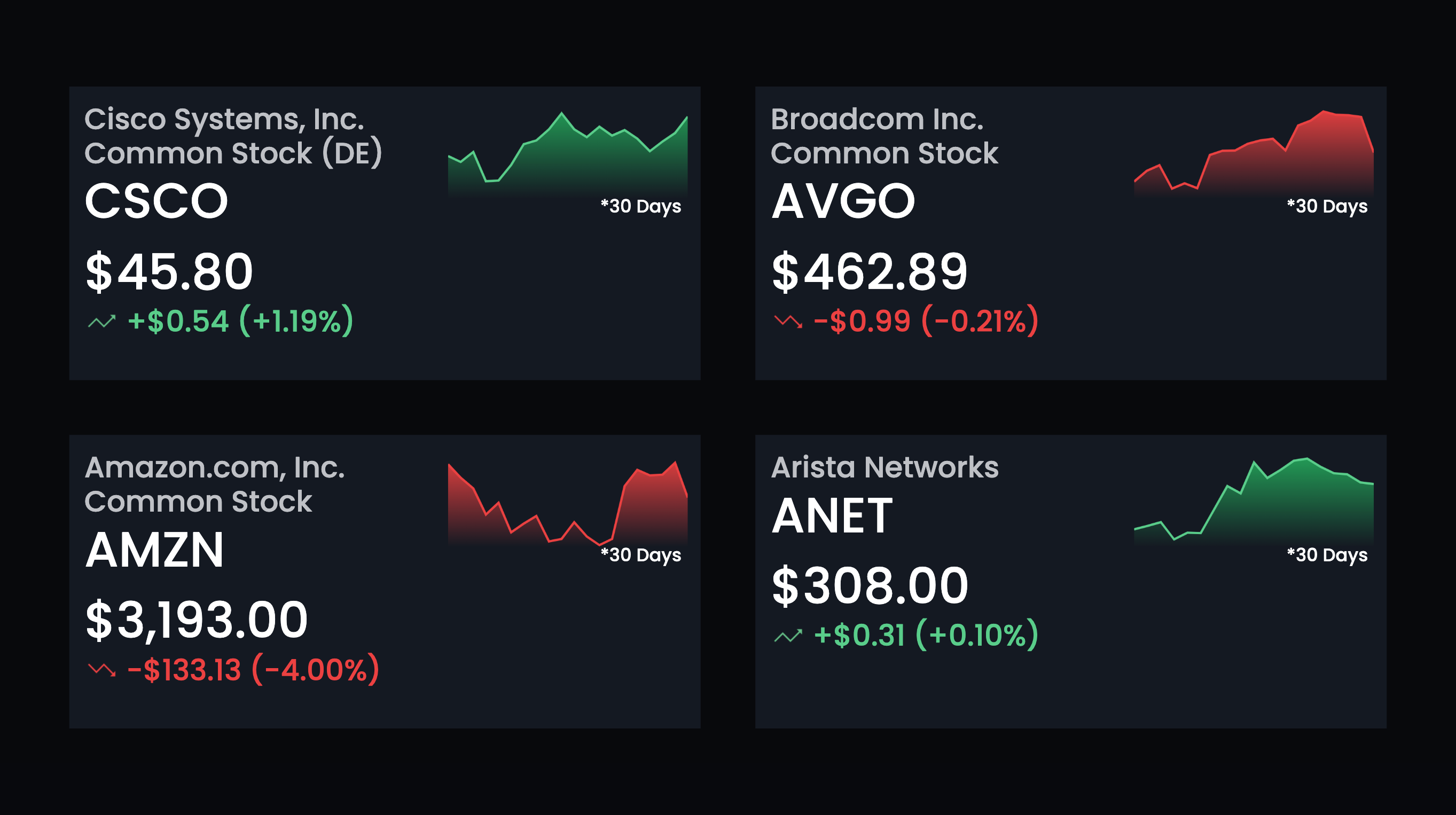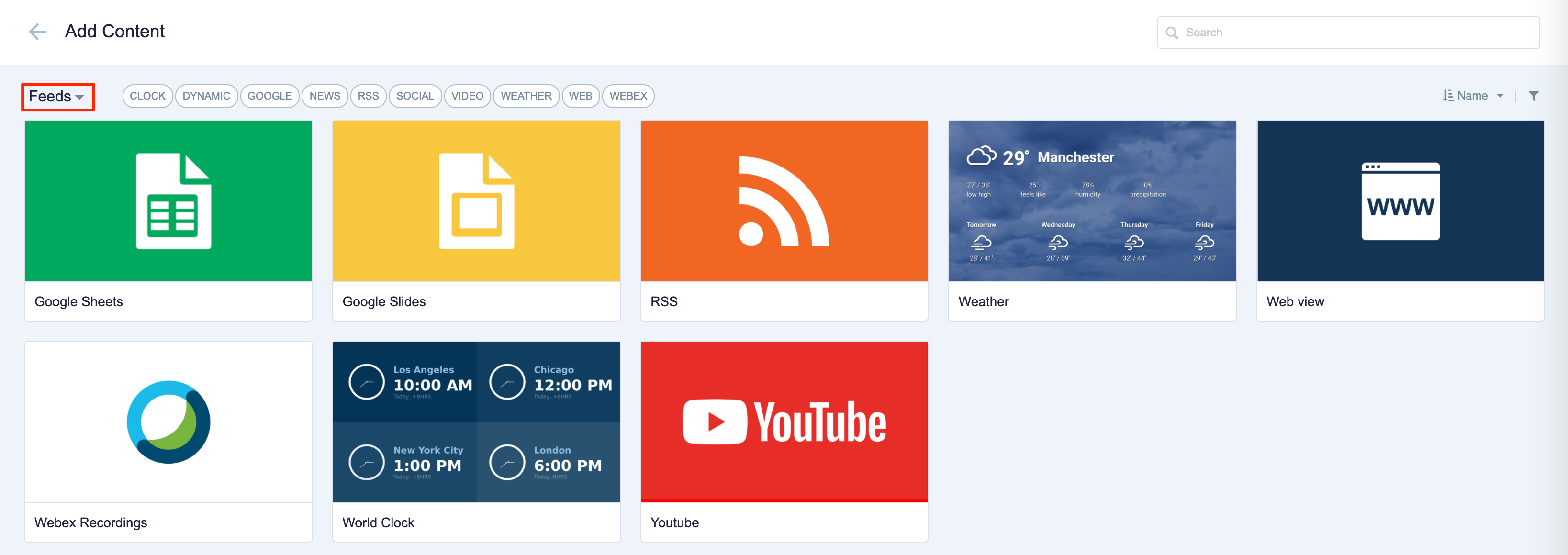The Stocks is a card theme based on Appspace’s latest card installment, the Financial card, allowing organizations to display live financial feeds from the New York Stock Exchange (NYSE), keeping employees or investors informed of the latest trends in the financial markets.

The Stocks theme retrieves feeds from the New York Stock Exchange (NYSE) and is able to display up to 10 company stock symbols per card.
These are the features and additional customizations available in the Stocks theme:
- Display the financial stock symbols of companies listed on the NYSE.
- Each stock symbol displays the company information, company symbol, stock price (30 days), current stock price, current day price, and the percentage change.
- Display in a Light or Dark theme.
- Enabling Display Options such as animation, and trend graph.
- Selected company stock symbols are displayed on the thumbnail in the Library, allowing users to quickly identify the symbols assigned to the financial card.
With the introduction of Content Categories in Appspace 8.0 ac.22, the Stocks theme is assigned with the Productivity & Engagement content category.
Visit our Appspace Card Gallery to find the perfect card to deliver your message.
This article provides instructions to create, configure, and customize the Stocks theme, which is created using the Financial card:
Prerequisites
- Ensure your device is compatible. Refer to the Supported Appspace Cards article.
- Account Owner, Publisher, or Author role to add or edit content in Library.
Create and Configure Stocks
Follow the instructions below to display financial feeds:
- Log in to your Appspace console.
- To create this card, select one of the following options:
- Click +Quick Action from the Appspace menu bar on the top right, and select Create Card.
- Click Library from the ☰ Appspace menu, and select a library or folder you wish to create the content in. Click +CREATE, and select Card.
- To create and add the card directly to an existing channel, refer to Add Content to Playlist Channels.
- Select Feed from the All Templates drop-down menu, and click Stocks.

ImportantIf you are unable to locate the content, try using either the Search bar, the Order by, or Filter icon to narrow down the content that you are looking for. - Enter the Title of the content as this will also act as the filename for the content. This is a mandatory field.

- In the Card section, click the + Add Symbol button, and enter the desired company name or symbol of the stock from the drop-down menu.
NoteYou may select up to 10 financial stocks per card. Once selected, you may reorder the stocks or click the delete icon to remove the selected stock.
- Click Save.
- In the Edit tab:
- Select either the Dark or Light Theme from the drop-down menu.
- Toggle the Search Active Symbols Only slider: This option must be unlocked via the theme editor.
- ON or enable to allow the search to return active stocks symbols only.
- OFF or disable to allow the search to return both active and inactive stock symbols.
- In the Displays Options section: toggle the slider to enable or disable.
- Show Trend Graph – Display the stock trend graph of the financial feed. Selected by default.
- Enable Animations – Display animations. Selected by default.
- In the Design section:
- Customize the Background Color or Media.
- In the Article tab: This section may be skipped.
- Include an Article or Caption to accompany the content item when being displayed on mobile apps, tablets, and other social collaboration apps.
- Enter a Referral Link to link more information to the content.
- In the Schedule tab: This section may be skipped.
- You may add the content to a channel by selecting the channel from the Add to channel drop-down menu, or leave it unassigned to be added later.
- When the content is assigned to a channel, the SCHEDULING and DISPLAY PROPERTIES options are displayed. Refer to the Configure Content Playback Properties: Dayparting, Frequency, Scheduling, in a Playlist Channel article for detailed configuration instructions.
- In the Settings tab: This section may be skipped.
- The Name field will be auto-populated to match the Title of the content which will also act as the filename for the content. This is a mandatory field.
- Select the Content Category from the drop-down menu to match the focus of the message, or leave it at the default content category.
- Enter any relevant Tags for the content. (Optional)
- Select a folder for the content in the Library Location drop-down menu to change the default folder location.
- Select an expiry date for the content from the Auto Delete Content from Library drop-down menu. (Optional)
- Upload an image to be used as the Thumbnail for the content.
- Once done, click SAVE.
Unlock Search Active Symbols Only Option
To unlock the Search Active Symbols Only option, follow the instructions below:
- Log in to your Appspace console.
- Click Library > Cards from the ☰ Appspace menu, and click the Themes tab.
- Click the Add button, and select Create Theme.
- Select the Financial Feed card template from the dropdown, and click Next.
- Enter the Theme Title for the card theme, and click the Lock icon to unlock the Search Active Symbols Only option.

- Once done, click Save.
- Use the newly created Stocks theme card to be able to add inactive stocks to the card theme.
Edit Stocks
Follow the instructions below to edit Stocks.
- Log in to your Appspace console.
- Click Library from the ☰ Appspace menu, and select a library or folder containing the content you wish to edit.
- Select and click the Financial card to edit, and select the desired tab to edit or view.
- In the Edit, Article, and Settings tabs:
- You may edit the content the same way as it was configured. For detailed instructions on how to do this, please refer to the Create and Configure Financial Card section above.
- In the Preview tab:
- Preview how the content is displayed on your device. You may adjust the aspect ratio to preview other display orientations.
- In the Channels tab:
- You may add the content to a channel by selecting the channel from the Add to channel drop-down menu, or leave it unassigned to be added later.
- When the content is assigned to a channel, the SCHEDULING and DISPLAY PROPERTIES options are displayed. Refer to the Configure Content Playback Properties: Dayparting, Frequency, Scheduling, in a Playlist Channel article for detailed configuration instructions.
- In the Analytics tab:
- View the individual content analytics in this tab. For more information, please refer to the Individual Content Analytics section of the Analytics article.
- In the Edit, Article, and Settings tabs:
- Once done, click SAVE.
Was this article helpful?